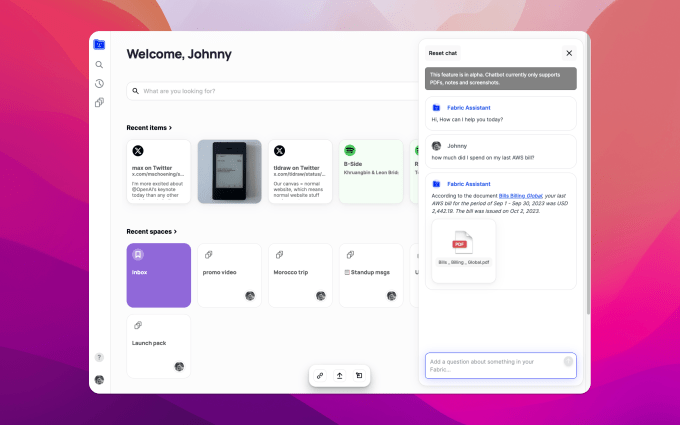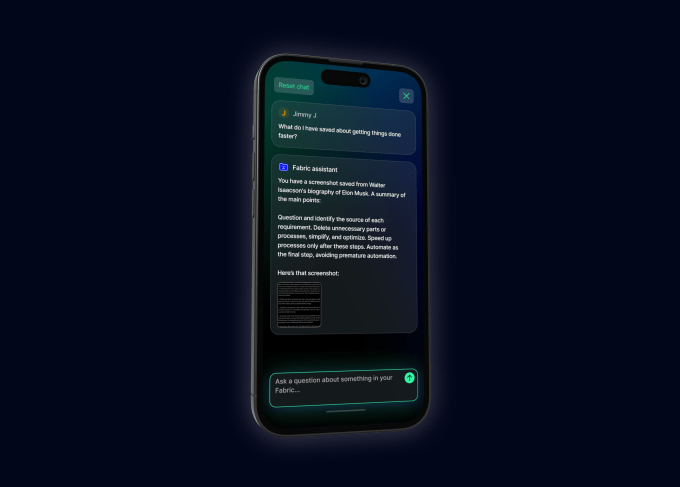Fabric introduces an AI-powered workspace and home for all your information
Can AI provide a better filesystem and workspace for personal productivity? That’s what a new startup, Fabric, launching today, aims to offer. The company has designed an AI-powered service that helps you organize your documents and other files, and works as a home for all your information that you can then query against using an AI assistant.
The service has some similarities with how Google’s Bard AI can now tap into your Google apps, like Gmail, Drive, Docs, Maps, YouTube, and more, or how the startup Rewind creates a searchable record of everything you’ve done by recording your computer usage. But instead of being limited to only Google apps, as Bard is, or intrusively recording everything you do, Fabric is meant to be opt-in and works with a range of files and uploads. Today, that includes any text-based document, any image, your bookmarks, and any piece of internet content with a link, with support for audio and video to soon come, as well as connections with other cloud services.

Image Credits: Fabric
Founded in 2022 by London-based software engineer Jonathan Bree, Fabric originally began as an idea to create a “multiplayer” collaborative web browser. That concept now lives on inside Fabric, as users can create dedicated shared spaces where they can collaborate on documents together and chat. For example, the spaces could be used to share project files, plan a trip together, gather inspiration, review a design, and more, the company suggests, which has some similarities to the web browser Arc’s shared folders and spaces.
To use Fabric, you can either upload individual files or folders, as with Google Drive or Dropbox, but you can also add links, or even compose a simple text note directly in Fabric’s interface. Then, you can use the built-in search box to find that information later, or even query an AI chatbot, Fabric Assistant, to help you discover the information you need using natural language queries. The latter can be helpful if you don’t remember the exact name of the file you’re looking for, It can also find screenshots you’ve saved by understanding what’s in the image or if there’s text in the image it can read.

Image Credits: Fabric
Powering Fabric is a group of around a dozen AI technologies, including OpenAI’s automatic speech recognition system Whisper for deciphering audio, plus AI models from Anthropic and others. In-house, the company built its own proprietary “unwrap engine” that detects the file type and then applies the correct tool for the job required.
“It puts everything into a universal format, and then it’s all available inside this workspace,” explains Bree. “So you can almost think of it a bit like a computer desktop from the future, or operating system from the future, where everything is there and you can actually work with it,” he says. “You can open the content, consume it, put it into a shared space, share this space with a co-worker, whatever. It’s not a search engine for your data. It has search, but it’s more like the kind of product that Dropbox should have made,” Bree adds.
Everything in Fabric is encrypted in transit and at rest — the same model used by Dropbox, Bree also notes. The company has not done a security audit yet, as it’s still building, but plans to in the near future as it adds support for connecting more services, like Google Drive, Notion, and Dropbox.
Fabric works via the web, as a browser extension, as a desktop app, or as a native mobile app, so you can access the service wherever you go. Bree believes the target demographic for Fabric today is the “prosumer” — that is researchers, creatives, and other power users who are switching contexts throughout their day, like freelancers bouncing between different projects, for example.

Image Credits: Fabric
“We’ve designed it for the kind of practical reality of: people are busy. People, actually, in reality, are not organized,” says Bree. “And also, information lives in so many places. You take a normal tool like Notion, and it’s a clean slate. But what about my bookmarks? What about my screenshots? What about all the other places information lives? We’ve taken this new approach where it’s a home for all information…our ambition is to make every place your information lives connectable,” he adds.
The startup is dropping its waitlist today, making Fabric available to early adopters who want to try out the service via the web or apps. (The iOS mobile app is not published to the public app store, but is available through TestFlight currently). Ahead of today’s launch, Fabric has been in testing with thousands of users.
The business model involves multi-tier plans that range from a modest $6 per month for 500GB up to $50 per month 4TB.
“So you can use it in a Dropbox-esque way,” Bree points out.
A remote team of three, based in both the U.S. and the U.K., Fabric’s founding team also includes Leonard Marcq and Ivo Silva. The startup has raised a pre-seed round of $1 million led by Seedcamp, with Acequia Capital and other angels participating, including those from Figma and others with AI expertise.



